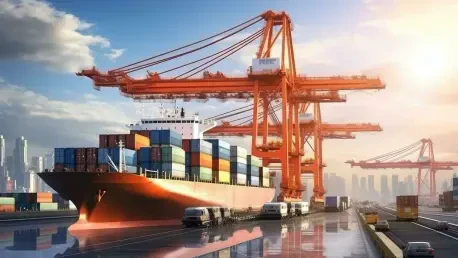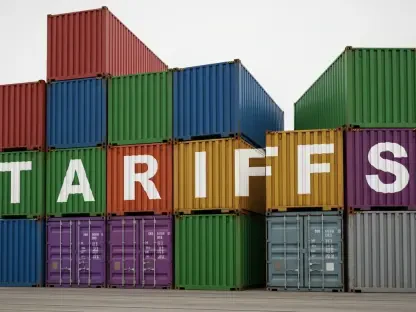In a move that has ignited fierce debate across the American industrial and trade sectors, the recent decision by the White House to suspend Section 301 fees on Chinese-built ships for a year has drawn sharp criticism from U.S. shipyard workers and unions. This policy shift, stemming from high-stakes trade negotiations with China, was intended to secure concessions on critical issues like rare earth exports and agricultural trade. However, it has left domestic shipbuilders feeling betrayed, as they argue it undermines years of efforts to revitalize an industry long plagued by neglect and fierce international competition. While some industry stakeholders celebrate the economic benefits of smoother trade relations, the suspension has exposed deep tensions between national industrial priorities and global market dynamics. This controversy raises critical questions about the balance between protecting domestic jobs and maintaining access to essential global supply chains, setting the stage for a contentious debate as the policy’s one-year term approaches review.
Domestic Backlash and Union Outcry
The decision to suspend fees on Chinese ships has struck a raw nerve among U.S. shipbuilding unions, including prominent groups like the United Steelworkers and the International Brotherhood of Boilermakers. These organizations had initially welcomed prior administration efforts to acknowledge decades of governmental oversight failures in the sector, viewing the Section 301 fees as a lifeline. The fees were designed not only to discourage reliance on Chinese ship orders but also to generate revenue for initiatives like the Maritime Security Trust Fund, a key component of proposed legislation aimed at bolstering domestic shipyards. With the suspension, union leaders argue that a vital competitive barrier has been removed, allowing billions in commercial orders to flow back to Chinese shipyards. This shift, they contend, directly threatens American jobs and jeopardizes the nation’s maritime strength at a time when rebuilding industrial capacity is more critical than ever in the face of global competition.
Beyond the immediate economic impact, the unions perceive this policy reversal as a profound betrayal of promises made to prioritize American workers. The suspension negates the spirit of executive actions intended to restore maritime dominance, leaving shipyard employees sidelined as international orders surge in China. Many workers express frustration over the lack of alternative protective measures to offset the loss of fee-generated funding, which could have supported modernization and workforce training in an industry struggling to keep pace with foreign rivals. The emotional toll is palpable, as communities dependent on shipbuilding face renewed uncertainty about their livelihoods. Critics within the unions also warn that this decision could set a dangerous precedent, signaling to other industries that domestic priorities may be sacrificed for short-term trade gains. As the policy’s effects unfold, the chorus of dissent among shipyard workers continues to grow, amplifying calls for immediate corrective action to safeguard their future.
Industry Support and Trade Benefits
In stark contrast to the unions’ outrage, a broad coalition of industry stakeholders has voiced strong support for the fee suspension, citing significant economic advantages. American importers, exporters, energy companies, and international shipping organizations have hailed the decision as a pragmatic step toward facilitating smoother trade operations at U.S. ports. Groups such as the American Petroleum Institute, National Retail Federation, and American Soybean Association argue that unencumbered access to Chinese ships reduces logistical costs and stabilizes supply chains critical to their sectors. This perspective is echoed by international bodies like the European Community Shipowners Associations and the International Chamber of Shipping, which emphasize the global benefits of reduced trade friction. The Asian Shipowners Association has even suggested making the suspension permanent, hinting at potential future pressure from foreign partners during upcoming negotiations.
The support from these stakeholders underscores a broader recognition of the interconnected nature of global markets, where strategic concessions can yield substantial returns. The suspension is seen as a key outcome of negotiations that also secured China’s commitment to halt rare earth export restrictions and resume normal purchases of American soybeans. For industries reliant on these materials and markets, the policy offers a reprieve from potential disruptions that could have rippled across the economy. Energy firms, in particular, highlight the importance of maintaining access to cost-effective shipping options to transport goods efficiently. While acknowledging the concerns of domestic shipbuilders, these groups argue that the immediate economic relief and stability provided by the suspension outweigh the drawbacks. This divide in opinion illustrates the complex trade-offs at play, where benefits to one sector often come at the expense of another, fueling ongoing debates about national economic strategy.
China’s Strategic Leverage in Negotiations
A pivotal factor in the White House’s decision to suspend the fees lies in China’s formidable leverage during trade talks, particularly through its dominance in the rare earth elements market. Controlling approximately 90 percent of global processing capacity via six major conglomerates, China has strategically positioned itself to influence industries worldwide. By implementing a licensing system to regulate exports of products containing rare earths—materials essential for high-tech military equipment like U.S. fighter jets and missiles—Beijing wields significant power over American production capabilities. This control, coupled with temporary halts on soybean imports, created immense pressure on U.S. negotiators to make concessions, ultimately leading to the fee suspension as part of a broader agreement aimed at mitigating these risks and securing critical supply chains.
The strategic use of rare earths as a bargaining chip highlights the broader challenges of navigating trade relations with a nation that holds such market dominance. Beyond military implications, rare earths are integral to numerous civilian technologies, making their steady supply a priority for economic stability. The agreement to ease export limits, even temporarily, was seen as a necessary compromise to prevent bottlenecks that could cripple key industries. However, this dependency raises concerns about the long-term vulnerability of the U.S. to China’s trade policies, especially as Beijing continues to consolidate control over strategic resources. The soybean trade resumption further illustrates how agricultural interests can be leveraged in negotiations, adding another layer of complexity to the talks. As this dynamic unfolds, it becomes evident that China’s influence will likely shape future U.S. trade decisions, posing ongoing challenges for policymakers seeking to balance domestic and international priorities.
Navigating Future Trade Dilemmas
Looking back, the suspension of Section 301 fees on Chinese ships sparked a significant rift between domestic industrial advocates and global trade proponents, reflecting the intricate challenges of modern economic policy. The sharp criticism from U.S. shipyard workers and unions underscored a deep sense of abandonment, as they saw protective measures dismantled in favor of broader trade concessions. Meanwhile, industry stakeholders who benefited from the decision praised its role in stabilizing critical supply chains and fostering economic relief. China’s strategic dominance in rare earths and other sectors loomed large over the negotiations, revealing the extent of global dependencies that shaped the outcome. As the one-year term of the suspension neared its review, the debate intensified, with both sides preparing to push their agendas. Moving forward, policymakers faced the daunting task of crafting solutions that could protect American jobs while securing essential trade relationships, potentially through targeted subsidies or revised tariffs to support shipbuilding without disrupting global markets.









